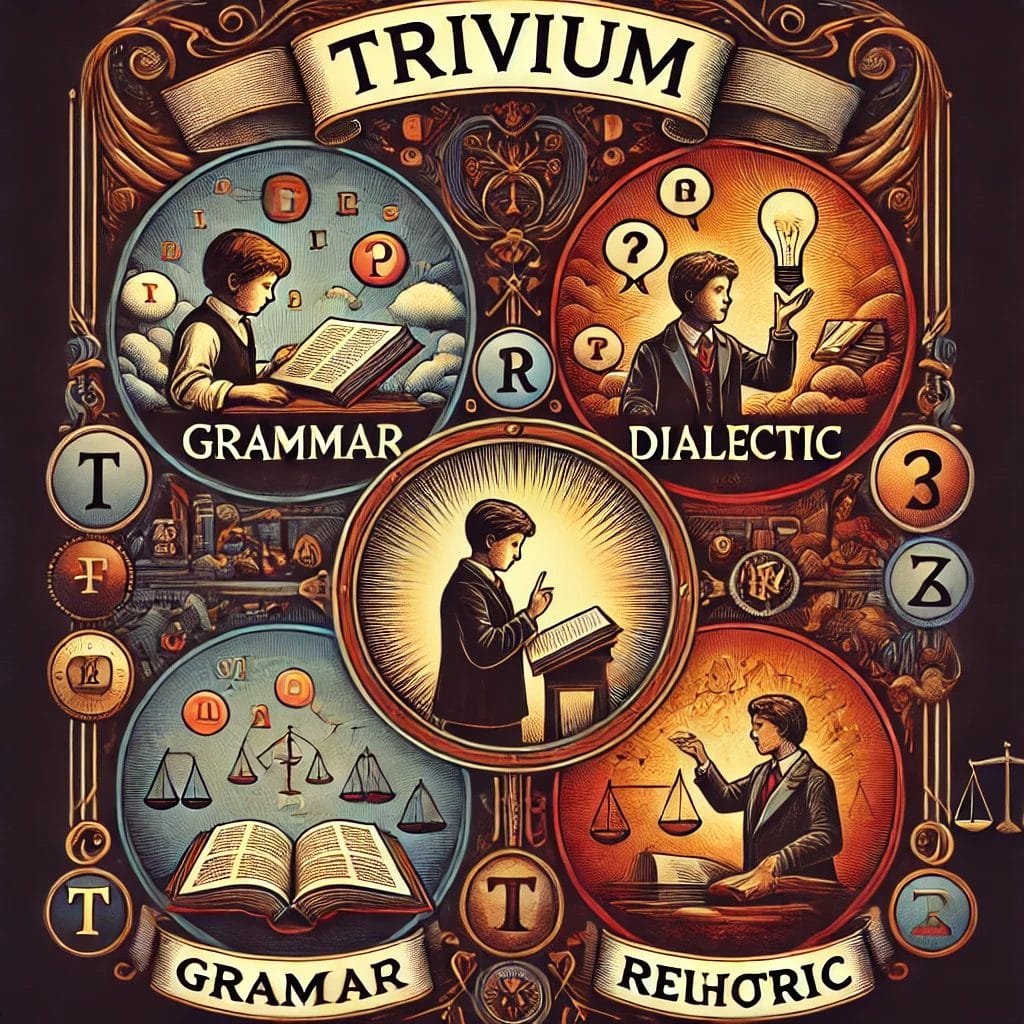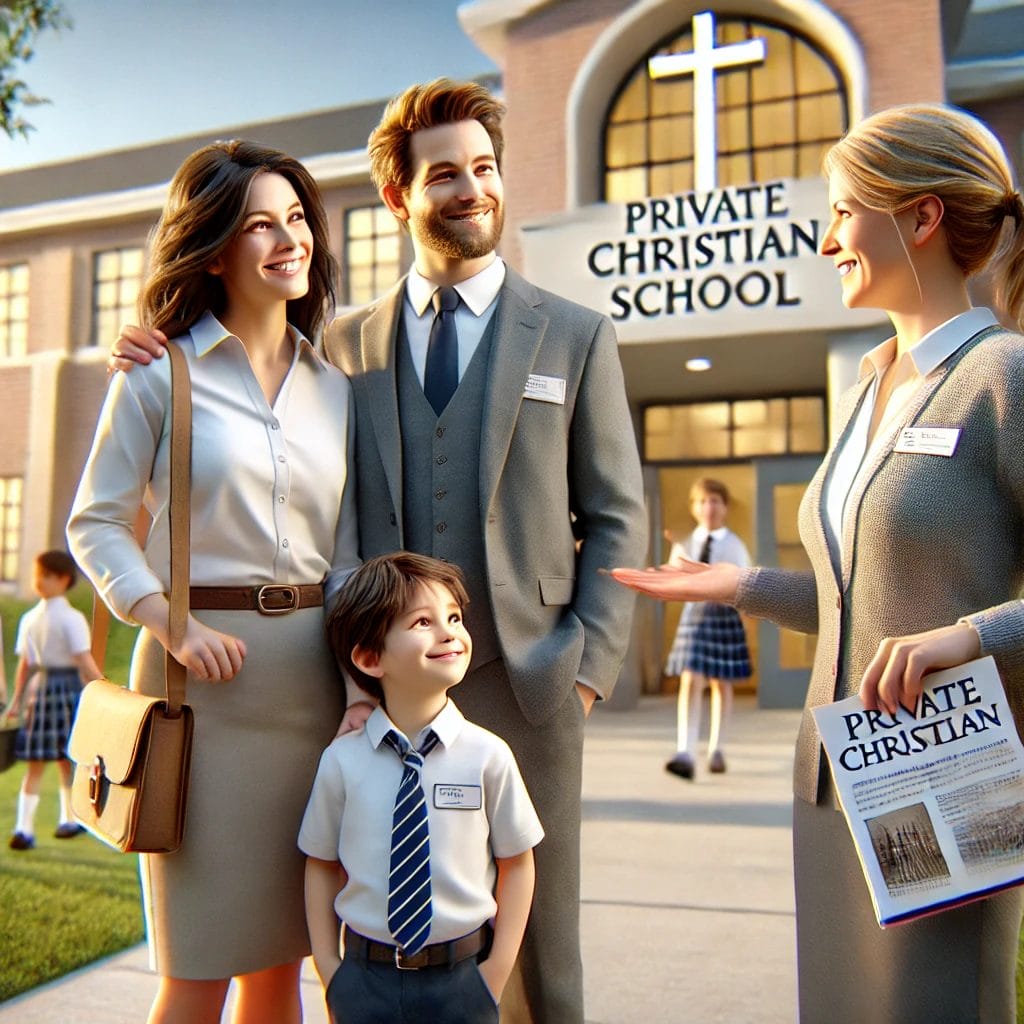Classical Christian Education mixes biblical teachings with classical works, like those by Homer and Plato, while using the Trivium’s stages—Grammar, Logic, and Rhetoric—to match how kids grow and learn. It focuses on strong academics, building character, and Christ-centered learning, offering a timeless and growing alternative to regular education.
What is Classical Christian Education?

What sets Classical Christian Education apart from other teaching methods?
It’s not just an old-fashioned way of learning—it’s a tested approach that builds curious learners and strong leaders.
This method blends challenging academics with a focus on character and faith, offering a well-rounded way to grow the mind, body, and soul.
At the heart of this approach is the Trivium, a method that matches how children naturally learn as they grow.
First is the Grammar stage, where kids focus on memorizing facts and mastering basics. Then comes the Logic stage, where they learn to think critically, solve problems, and make connections. Last is the Rhetoric stage, where they practice expressing ideas clearly and persuasively.
These steps prepare students to not just find answers but to ask meaningful questions.
Unlike modern schooling, which often emphasizes standardized testing, this form of private schools education combines biblical teachings with classic works from thinkers like Homer, Plato, and Shakespeare.
Learning Latin and Greek adds depth to their understanding of language and culture, providing students with a solid base for future studies.
This approach has been embraced by numerous schools across the U.S., showcasing its enduring value and increasing adoption.
The History and Legacy of Classical Christian Education
Classical Christian Education began in the ancient Greco-Roman world, where learning focused on gaining wisdom and living with virtue.
Thinkers like Plato and Aristotle taught ideas about logic, moral reasoning, and clear communication.
Early Christians later built on these ideas, blending classical thought with biblical truth to create a way of learning that aimed to grow both the mind and the soul.
In the medieval period, this model became central to Western education through Europe’s cathedral schools and universities.
The Trivium (grammar, logic, rhetoric) and Quadrivium (arithmetic, geometry, music, astronomy) became key tools for teaching.
These disciplines didn’t just pass on knowledge—they shaped character and helped students seek truth, both earthly and divine.
Today, even with modern education’s focus on tests and secular lessons, Classical Christian Education continues to gain interest.
Schools, homeschoolers, and private schools offering robust educational programs are keeping this timeless way of learning alive in the 21st century.
The Trivium: The Core of Classical Education

At the center of Classical Christian Education is the Trivium—a simple yet powerful method that matches a child’s natural growth stages.
It has three parts: Grammar, Dialectic, and Rhetoric.
Together, they help children grow in both knowledge and character, giving them tools they can use to keep learning for life.
The Grammar Stage is all about building a solid foundation.
At this stage, young kids soak up knowledge through memory, songs, rhymes, and repetition.
They learn basic facts about language, history, math, and scripture.
This taps into their natural knack for memorizing, giving them the “building blocks” they’ll use later for deeper thinking.
As kids grow, they move into the Dialectic Stage, where they focus on logic and reasoning.
Here, they start asking “why” and learn to think critically.
This stage helps them become curious, analyze ideas, and figure out what’s true.
They practice debates, study formal logic, and connect dots in what they’re learning.
It’s the bridge between knowing facts and understanding them.
Finally, in the Rhetoric Stage, students learn to communicate well.
They master persuasion and gain confidence in sharing their ideas.
By studying classical texts, scripture, and examples, they learn how to speak clearly and wisely.
This stage prepares them to lead and make a positive impact.
The Trivium isn’t a typical approach to private schools education—it’s a purposeful plan to shape lives through timeless methods rooted in tradition.
Core Values of Classical Christian Education
Classical Christian Education emphasizes Christ-centered learning as its foundation.
Combining biblical teachings with enduring works by thinkers such as Plato, Homer, and Shakespeare, it offers a holistic perspective that integrates faith, knowledge, and life.
By connecting education to scripture, students are inspired to recognize God’s presence in every subject—whether they’re exploring geometry or studying ancient languages like Latin and Greek.
This method goes beyond academics and prioritizes the development of character and virtues.
Qualities such as courage, humility, justice, and self-control are modeled not only in lessons but also in everyday behavior.
The aim is to cultivate wise, moral individuals who are prepared to make sound decisions throughout their lives.
What distinguishes this approach is its view of students as complete beings—mind, body, and spirit.
Families seeking private schools education with a higher purpose often gravitate toward this values-based model.
It prepares students not just for college or careers but for a life of faith, wisdom, and discernment.
For many, Classical Christian Education represents far more than academics—it’s a lifelong journey toward wisdom and virtue.
Classical Christian Education in Today’s World
In a time when technology and educational trends change faster than ever, Classical Christian Education provides a meaningful and stable alternative.
This approach isn’t just about tradition—it’s a forward-thinking choice for families who prioritize character, academic excellence, and foundational values for their children.
At its core is the Trivium, which emphasizes grammar, logic, and rhetoric.
This structure aligns with the natural stages of a child’s development, enabling them to first grasp foundational knowledge, then develop critical thinking skills, and ultimately articulate ideas with clarity.
Moving beyond an emphasis on test scores, this model weaves together biblical principles and classical literature from figures like Plato and Shakespeare, fostering both spiritual and intellectual growth.
This blend of faith, intellectual rigor, and enduring values is why many families are choosing this educational path.
For schools seeking to expand their reach, Clickmill can help connect your institution to more families seeking private schools education anchored in this transformative approach.
The Role of Teachers in Classical Christian Education

Teachers play a pivotal role in Classical Christian Education.
They mentor students, helping them grow academically and build virtues rooted in biblical truth.
This approach transcends memorization; it focuses on equipping students with tools for lifelong learning.
By modeling critical thinking, curiosity, and moral character, teachers provide an example that stands out in today’s ever-changing educational landscape.
Lifelong learning is essential for teachers within this educational model.
Their dedication to expanding both their knowledge and faith inspires students to cultivate a love for learning.
Whether examining timeless texts like Plato or gaining deeper insights into Scripture, teachers exemplify the idea that education is a continuous, lifelong process.
The strong connection between teacher and student fosters respect and discipline.
This dynamic not only supports academic success but also shapes students into self-assured, reflective individuals who grasp their purpose.
By weaving truth, goodness, and beauty into every lesson, teachers in private schools offering this type of education prepare students to approach life with wisdom, faith, and resilience—attributes that are desperately needed in the wider world.
Why Classical Christian Education Stands Out
Classical Christian Education combines strong academics with a faith-based focus, giving students an experience that goes beyond regular schooling.
At its heart, this approach fosters curious minds and strong moral character.
By using the Trivium—Grammar, Logic, and Rhetoric—students build a solid knowledge base, learn to think critically, and express their ideas with clarity and confidence.
One key benefit is its balance of academic achievement and cultivating a deep sense of wonder.
Students explore timeless works by writers like Homer, Plato, and Shakespeare, while also studying classical languages like Latin and Greek.
This helps them deeply understand culture and history, sparking curiosity and preparing them to face life’s tough questions.
Another significant advantage is the integration of faith into daily learning.
Every subject ties back to biblical teachings, showing students how their beliefs connect to the world around them.
This approach doesn’t just create well-educated individuals—it shapes wise, humble, and purposeful people.
For families seeking top-tier private schools education, this model is especially appealing.
Whether for college or life, Classical Christian Education equips students with a firm foundation for lifelong learning and spiritual growth.
It’s an approach that truly transforms lives.
Challenges and Misconceptions About Classical Christian Education
Classical Christian Education, while built on old and lasting principles, is often misunderstood.
Some think its methods are stiff, leaving no room for creativity or individuality.
However, this approach to private schools education fosters creativity and critical thinking by helping students dive deeply into great works of literature, philosophy, and theology.
Through works by authors like Shakespeare, Homer, and Plato, combined with biblical teachings, students learn to see the world in a deeper, more thoughtful way.
Another false idea is that Classical Christian Education is only for the very religious or for those considering careers in theology.
While faith plays a big role, this model also focuses on intellectual growth, moral character, and broad knowledge—traits that matter for any career or life choice.
Students develop skills like clear thinking, strong communication, and cultural awareness, all of which are useful in any field.
Cultural challenges add to the mix.
In a time when people look for fast results and quick wins, Classical Christian Education’s focus on depth, wisdom, and careful learning can feel out of place.
But it’s this very focus that prepares students to thrive in a busy, ever-changing world.
By tackling these misunderstandings, families can see the real value of this education: shaping the mind and the soul together.
How Classical Christian Education is Different from Conventional Education

Classical Christian Education (CCE) takes a distinctive approach by addressing the whole person—mind, body, and spirit.
Unlike traditional schooling, which often emphasizes standardized tests and rote learning, CCE focuses on critical thinking, strong morals, and a lifelong love for learning.
A standout feature is how the curriculum is structured.
CCE is built on the Trivium, a three-stage framework—Grammar, Logic, and Rhetoric—that aligns with children’s developmental stages.
In the Grammar stage, students establish a robust knowledge base.
The Logic stage emphasizes analytical thinking.
Finally, the Rhetoric stage equips students to articulate their ideas persuasively and with confidence.
This philosophy ensures students learn how to think and grow, not merely memorize.
In contrast, conventional private schools education often employs a more subject-specific framework, potentially missing an integrated approach to tie learning together.
CCE blends timeless works from influential authors like Homer and Shakespeare with biblical principles, creating a deep cultural and spiritual foundation for students.
Parents frequently prefer CCE for its transformative impact.
It molds students into well-rounded individuals, fostering academic success and ethical strength.
While preparing kids for college or careers, it also shapes them into confident, purpose-driven individuals poised to make meaningful contributions to their communities.
This character-centered and faith-driven model offers families a compelling alternative to traditional schooling approaches.
Why Faith-Based Education Shapes Tomorrow’s Leaders
Classical Christian Education helps shape future leaders by combining spiritual growth with academic learning.
This approach stands out because it prepares students not just for a job, but for a life of purpose.
This type of learning focuses on both the heart and mind, with Christ at the center.
Biblical principles are woven into every subject—history, science, and more.
Students don’t just learn facts; they grow a strong moral foundation.
They are taught to face life’s challenges with courage, wisdom, and integrity.
It’s not about reciting scripture—it’s about living it.
One key strength of this approach is how it builds confidence based on both faith and knowledge.
By studying classic works, students learn to think critically and communicate well—skills every leader needs.
Plus, with a focus on values like humility, justice, and perseverance, these students grow into leaders who act with empathy and purpose.
In the end, a Classical Christian Education program helps students discover their God-given purpose.
Graduates of such programs don’t just succeed—they inspire and serve with strong faith and character, setting them apart in the realm of private schools education.
Resources to Learn About Classical Christian Education
Learning about Classical Christian Education can feel like stepping into a tradition full of wisdom.
Whether you’re a parent or a teacher, there are many ways to explore and grow your understanding.
A good place to start is Dorothy Sayers’ “The Lost Tools of Learning.”
It offers a general introduction to the Trivium, which focuses on Grammar, Logic, and Rhetoric—the core of this time-honored approach to learning.
For a broader perspective, Douglas Wilson’s “Recovering the Lost Tools of Learning” provides insights into how faith integrates with this model, making it another thoughtful read.
For a practical understanding of this method, consider learning more about schools or homeschooling programs rooted in these principles.
There are a variety of organizations and communities that focus on supporting this educational model.
Many families also explore homeschooling curricula designed to follow this tradition, which provides a solid framework for parents interested in this approach.
For more modern resources, try podcasts, blogs, or online groups that discuss private schools education and share stories about its intersection with these classical methods.
These platforms often share valuable insights, stories, and advice to help you along your journey.
Start today and rediscover what education is all about: growing wisdom, virtue, and a love for learning at any age.
Choosing a Private Classical Christian School

Choosing the right school for your child is a significant decision that influences both their academic journey and faith formation.
For families considering Classical Christian Education, it’s essential to spend time selecting a school that reflects your family’s core values and priorities.
Focus on how the school integrates faith and academics.
A strong classical Christian institution emphasizes not just exceptional academics but also the development of character and virtue rooted in a Christ-centered educational philosophy.
Check whether the school adheres to the Trivium’s three stages—Grammar, Logic, and Rhetoric—which promote knowledge, critical thinking, and effective communication skills.
Schedule visits to the schools you have in mind.
Take note of classroom interactions and speak with teachers to learn about their mentorship approach and their ability to foster lifelong learning.
Ask questions like: Do they promote wisdom and virtue? What resources—including historical texts, Bible lessons, or other materials—shape their curriculum?
Additionally, investigate extracurricular programs to see how they reinforce the institution’s mission and principles.
Finally, reflect on how the school’s community will support your family’s aspirations and goals.
Through thoughtful evaluation and intentional questioning, you can choose a school that offers private schools education while fostering both academic excellence and spiritual development.
FAQs
Classical Christian Education is a method of teaching that combines traditional classical education techniques (like the Trivium) with Christian principles. It emphasizes rigorous academics, character-building, and integrating biblical truths into every subject.
The Trivium consists of three stages—Grammar, Logic, and Rhetoric—which align with students’ developmental phases. The Grammar stage focuses on foundational knowledge, the Logic stage fosters critical thinking, and the Rhetoric stage develops effective communication skills. These elements equip students for success in both academics and life.
Many families appreciate its holistic approach, which merges faith-based teaching with academic excellence, fostering virtues like wisdom and discipline. It also serves as an alternative to standardized, test-oriented education systems, promoting deeper engagement and a love of learning.
Though rooted in Christian teachings, this educational model appeals to families seeking strong academics, moral development, and a comprehensive approach to learning. Its advantages extend beyond religious contexts and are valued by families of various backgrounds.
Families can look into books on classical teaching methods, connect with private schools offering this type of education, or join homeschooling groups focused on this approach. Numerous networks and associations also provide support for those exploring this model.

Responses